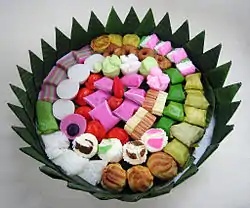Jajan pasar
Jajan Pasar (Javanese: market snacks) refers to traditional Javanese cakes sold in the Javanese markets.[1]

Etymology
Jajan Pasar is a term initially used to describe the traditional Javanese snacks. Other words that are used to refer to it are Jajan, Pasar roti (from Sanskrit "rotika" which means Indian flatbread) for any baked food, Pasar bolu (from Portuguese "bolo" - sponge cake) for sponge cake or cakes with the same texture, and kue for Chinese snacks and birthday cakes.
It is common within cities to call them "kue" due to the strong presence of people of Chinese descent who prefer using their language rather than native Javanese words.
The use of kue, instead of Jajan Pasar, has become increasingly widespread as more suburbs and villages have become urbanized, thus blurring the lines between what constitutes the 'native food' and what does not.
Controversy
Younger generations believe that traditional Javanese snacks do not exist since the name "kue" suggests that everything is Chinese.
This has led to many debates and has often left young Javanese thinking that their culture has contributed nothing. Some believe that their culture has been stolen.
See also
References
- Asian Folklore Institute; Society for Asian Folklore; Nanzan Daigaku. Jinruigaku Kenkyūjo; Nanzan Shūkyō Bunka Kenkyūjo (1997). Asian Folklore Studies. Nanzan University Institute of Anthropology. p. 267. Retrieved February 2, 2021.
- Alamsyah, Y. (2006). Kue basah & jajan pasar: warisan kuliner Indonesia (in Malay). Gramedia Pustaka Utama. pp. 7–8. ISBN 978-979-22-2152-7. Retrieved February 2, 2021.
- "10 Jajan Pasar Paling Populer dan Digemari di Indonesia, Apa Saja?". IDN Times (in Indonesian). January 7, 2021. Retrieved February 2, 2021.
- Purnomo, Budi; Salzabila, Rizky (April 1, 2016). "Model of Empowering Marginalized Communities Around Star Hotels Through Corporate Social Responsibility". Atlantis Press. pp. 251–256. doi:10.2991/atf-16.2016.36. ISSN 2352-5428. Retrieved February 2, 2021.
